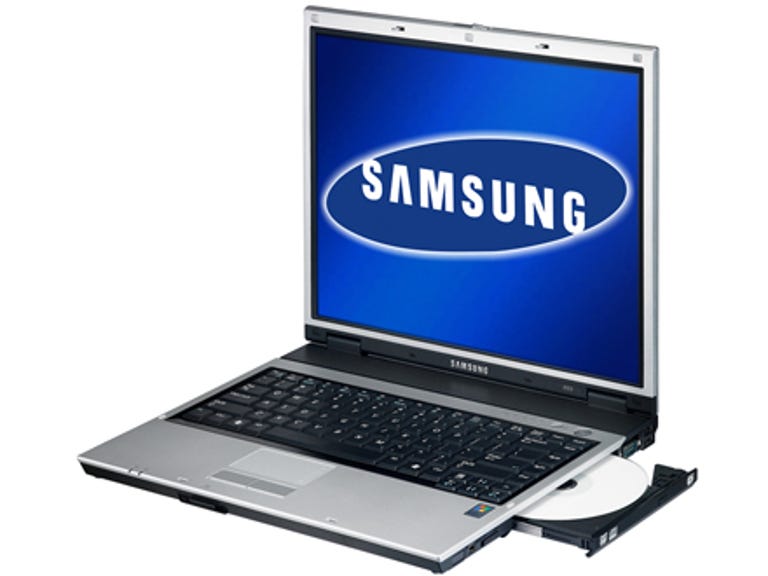 Why You Can Trust CNET
Why You Can Trust CNET Samsung R65 review: Samsung R65
The Samsung R65 is an overpriced, underperformer that is beaten by cheaper alternatives.
The latest notebook in Samsung's multimedia R series is the R65. Sporting Intel's Duo processor, almost a standard among notebooks these days, as well as a dedicated graphics card, the R65 on paper has the credentials to rival some high-performance PCs. In reality, results aren't as impressive. For entertainment purposes performance is pretty average and considering the R65 is aimed at multimedia applications, the lack of a widescreen display is disappointing.
The Good
The Bad
The Bottom Line
Design
Samsung is known for its unusually light notebooks and the R65 is no exception at just under 3kg. Overall size is good. Thickness is roughly 40mm and with the 15-inch 4:3 screen the R65 fits comfortably into the midsize notebook category. However, we would have liked to have seen a 15.4 inch widescreen display as used by most competitors. The screen of the R65 supports a maximum resolution of only 1024 x 768. Its anti-glare coating works well but can be very reflective under bright light. The overall look of the R65 is pleasant, but its design isn't really pushing the envelope. It has a matte-silver and black chassis that is very similar to some Acer notebooks. Build quality was a low point -- at times the battery would come loose and materials had a cheap feel to them.
Features
Though the R65 is promoted as a multimedia notebook, the lack of several key features was surprising. One of the standout features is the proprietary AVStation application that enables you to play CDs and movies without the need to load up Windows. Unfortunately, a lack of dedicated multimedia buttons, such as play or skip, makes the experience less enjoyable. Using the latest Centrino platform, the R65 has a host of network options including the standard 802.11a/b/g Wi-Fi, Bluetooth, infrared, modem and 10/100 Ethernet port. These features are pretty much an industry standard. We would have liked to have seen a faster Gigabit connection. Other connections include 4 USB ports, two PC card slots and a mini-FireWire port. Samsung have even included a serial port for older devices. A disappointing omission is the lack of a DVI port.
The optical drive is a dual-layer burner supporting DVD-RAM, and the hard-drive, though listed at 80GB, only has 60GB due to part of the drive being used for recovery backups -- this feature is quite handy so we didn't mind. The hard-drive still relies on the older parallel ATA standard which makes it slower than some of the newer drives on the market. One of our favourite features is the 6-in-1 multiple memory card slot capable of reading SD, MMC, Memory Stick, Memory Stick Pro and xD-Picture cards without requiring additional adaptors.
The R65 comes with a dedicated videocard in the form of Nvidia's GeForce Go 7400 with 64MB of TurboCache memory. Graphics performance is enhanced by using both the dedicated VRAM and system memory for rendering images but this can often cause applications to slow down further. The R65 uses the SoundMax HD audio driver capable of SRS 3D sound output as well as support for TruSurround XT and WOW audio technologies.
Performance
Our test notebook was running a 1.66GHz processor with 512MB of DDR2 RAM. We found the performance in most applications to be slow. We managed to achieve 184 in our MobileMark 2005 test which is reasonable, but nothing to get excited about considering the specs of this notebook. Despite its flash sounding graphics card, the R65 didn't perform well in our tests. We had to turn down screen resolutions for hardware intensive programs just to make them usable. It didn't help that the hard drive was slower than many other competitor notebooks.
In our tests for battery performance the R65 achieved mixed results. Using the MobileMark 2005 battery-life test, we managed only 2 hours and 36 minutes. This result is well below those of competitors. Watching a DVD, the battery did manage to last almost 3 hours at 160 minutes.
Service & Support
Samsung notebooks come with a one-year international warranty and a very useful backup CD. Web support comes with downloadable user manuals, drivers and software patches. It was good to see the included operating system was the Professional edition of windows.
